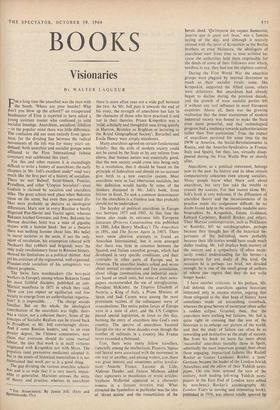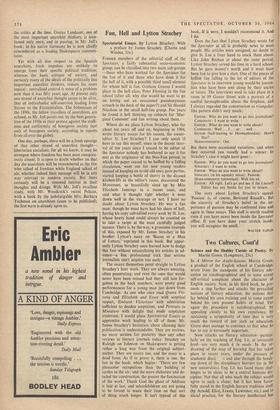BOOKS
Visionaries
v WALTER LAQUEUR
FOR a long time the anarchist was the man with the bomb. `Where are your bombs? Why don't you blow up the school?' an exasperated headmaster of Eton is reit-rted to have asked a young assistant master who confessed cto mild socialist leanings. Anarchism, socialism, fiihilism —in the popular mind there was little difference. The confusion did not stem entirely from ignor- ance, for the dividing line between the radical movements of the left was for many years un- defined; both anarchist and socialist groups were affiliated to the First International (whose centenary was celebrated this year).
For this and other reasons it is exceedingly difficult to write a history of anarchism; the early chapters in Mr. Joll's excellent study* read very much like the first part of a history of socialism. There we met Babeuf, Saint-Simon, Fourier, Proudhon, and other 'Utopian Socialists'—even Godwin is claimed by socialists and anarchists alike. The great schism took place when Bakunin came on the scene, but even then personal dis- likes were probably as decisive as ideological differences. Marx saw in every Russian a barely disguised Pan-Slavist and Tsarist agent, whereas Bakunin loathed Germans and Jews. Bakunin (as Herzen describes him) was a man of gigantic stature with a leonine head: but as a theorist there was nothing leonine about him. His belief in secret societies as the main, if not the only, agent of revolution, his assumption (shared with Nechaev) that robbers and brigands were the only truly revolutionary force in Russian history, showed his limitations as a political thinker. And yet his criticism of the regimented, well-organised, Prussian-style socialism of his antagonists was almost prophetic.
The Swiss Jura watchmakers (the best-paid Workers in Europe), among whom Bakunin found his most faithful disciples, published an anti- Marxist manifesto in 1871 in which they said, `How can you expect an egalitarian and free society to emerge from an authoritarian organisa- tion? It is impossible. . . .' The charge sounds familiar. But on the whole, the ideological contribution of the anarchists was slight; theirs Was a vision, not a coherent theory. Some of the concepts of Socialist Realism can be traced back to Proudhon, as Mr. Jolt convincingly shows. And if some Russian leaders, and, to an even greater degree, the Chinese communists, now claim that everyone should do some manual labour, the idea that work is in itself virtuous originated with Kropotkin not with Marx. The populists (and preventive medicine) adopted it. but in the tenets of historical materialism it is not maintained that work per se is a good thing.
The gap dividing the various anarchist schools Was and is so wide that it is very nearly impos- sible to generalise. Marxism stresses the unity of theory and practice, whereas in anarchism
* THE ANARCHISTS. By James Joll. (Eyre and Spottiswoode, 35s.)
there is more often titan not a wide gulf between the two. As Mr. Joll puts it towards the end of his essay, the strength of anarchism has lain in the character of those who have practised it and not in their. theories. Prince Kropotkin was a `mild, scholarly and thoughtful man living quietly in Harrow, Bromley or Brighton or lecturing to the Royal Geographical Society'; Ravachol and Emile Henry were simply murderers.
Many anarchists agreed on certain fundamental beliefs: that the evils of modern society could not be cured by the State or by any reform from above, that human nature was essentially good, that the new society could come into being only by a revolution, that it should be based on the principle of federalism and should on no account give birth to a new coercive system. Most anarchists were in fact libertarian socialists, but this definition would hardly fit some of the thinkers discussed in Mr. Joll's book, from Stirner to Sorel. To seek a common denominator for the anarchists is a fruitless task that probably should not be undertaken.
The heyday of political anarchism in Europe was between 1875 and 1905. At that time the theme also made its entrance into European literature (Princess Casantassima was published in 1886, John Henry MacKay's The Anarchists M 1891, and The Secret Agent in 1907). There were some abortive attempts to found an Anarchist International, but it soon emerged that there was little in common between the Spanish and Italian anarchist groups, which had developed in very specific conditions, and their comrades in other parts of Europe and in America. The anarchist leaders talked and wrote about mutual co-operation and free association, about village communities and industrial socie- ties based on small units, but sonic of their news- papers recommended the use of nitroglycerine. President McKinley, the Empress Elisabeth of Austria, a King of Italy, a Prime Minister of Spain and Sadi Carnot were among the most prominent victims of the subsequent wave of assassinations. The entire police forces of Europe were in a state of alert, and the US Congress passed special legislation, in force to this day, banning the entry of anarchists into God's own country. The spectre of anarchism haunted Europe for two or three decades even though the number of militants in a country like France never exceeded a thousand.
True, there were many fellow travellers, especially among the intellectuals. Pissarro, Signac and Seurat were associated with the movement in one way or another, and among writers, too, there was great interest, and sometimes active involve- ment—Anatole France, Leconte de Lisle, Alphone Daudet and Octave Mirbeau added their signatures to manifestos or wrote articles; Stephane Mallarme appeared as a character witness in a famous terrorist trial. What • attracted the Symbolists in particular was the idea of 'direct action' and the romanticism of the heroic deed. 'Qu'importe les vagues humanites, pourvu que le geste soft beau,' was a famous saying of the day, and although it scarcely chimed with the spirit of Kropotkin or the Reclus brothers or even Malatesta, the ideologists of anarchism were from time to time arrested be- cause the authorities held them responsible for the deeds of some of their followers over which, needless to say, they had not the slightest control.
During the First World War the anarchist groups were plagued by internal dissension as much as their socialist rivals; some, like Kropotkin, supported the Allied cause, others were defaitistes. But anarchism had already begun to decline during the previous decade, and the growth of mass socialist parties left it without any real influence in most European countries. Above all, there was the growing realisation that the inner momentum of modern industrial society was bound to make the State even more powerful, and that technological progress had a tendency towards authoritarianism rather than 'free association.' True, the impact of anarchism persisted for some time (in the IWW in America, the Social-Revolutionaries in Russia, and the Anarcho-Syndicalists in France, Italy and Spain), but they, too, virtually disap- peared during the First World War or shortly after.
Anarchism, as a political movement, belongs now to the past. Its history and its ideas remain comparatively unknown even among socialists. Many people know what Marx said about anarchism, but very few take the trouble to consult the sources. For that reason alone Mr. Joll's book is very welcome. If the diffuseness of anarchist theory and the inconsistencies of its practice made his- assignment difficult, he no doubt found help in the eminently readable auto- biographies by Kropotkin, Emma Goldman, Edward Carpenter, Rudolf Rocker and others. Their Marxist contemporaries, such as Plekhanov or Kautsky, left no autobiographies, perhaps because they thought less of the historical im- portance of the individual, more probably because their life stories would have made much duller reading. Mr. Joll displays both mastery of the sources and a sympathetic (if often neces- sarily ironic) understanding for his heroes—a prerequisite for any study of this kind. On occasion he is perhaps too brief, not detailed enough; he is one of the small group of authors of whom one regrets that they do not write longer books.
I have another• criticism; in his preface, Mr. Jolt defends the anarchists against historians interested only in success stories, arguing that those relegated to the 'dust heap of history' have sometimes made an astonishing comeback, whereas the great heroes of yesteryear often suffer a sudden eclipse. Granted, then, that the anarchists were nothing but failures, Mr. Jolt is quite right in stressing that the aim of the historian is to enlarge our picture of the world, and that the study of failure can often be as rewarding and instructive as the study of success. But from his book we learn far more about 'successful' anarchists (notably those in Spain, admittedly the most important group), than about those engaging, impractical failures like Rudolf Rocker or Gustav Landauer. Rocker, a 'pure' German, became the leader of the London Jewish Anarchists and the editor of their Yiddish news- paper. (At one time, around the turn of the century, both leading left-wing Yiddish news- papers in the East End of London were edited by non-Jews.) Rocker's autobiography My. London Years (a moving and interesting book), published in 1956, was almost totally ignored by
the critics at the time. Gustav Landauer, one of the most important anarchist thinkers, is men- tioned only once, and in passing, in Mr. Joll's book; in his native Germany he is now chiefly remembered as a leading Shakespeare commen- tator.
Yet with all due respect to the Spanish anarchists, fresh impulses are unlikely to emerge from their specific political tradition; whereas the basic critique of society, and certainly many of the ideals of the politically less important anarchist thinkers, remain far more topical: centralised control is more of a problem now than it was fifty years ago. At present only one strand of anarchist thought seems to be alive, that of individualist self-assertion leading from Stirner to the Existentialists. The bohemians of the 1890s, the fellow travellers of anarchism, are echoed, as Mr. Jolt points out, by the beat genera- tion of the 1950s in their protest against the stuffi- ness and conformity of bourgeois society (not only of bourgeois society, according to reports from all over the globe).
One day, perhaps, there will be a fresh upsurge of that other strand of anarchist thought— libertarian socialism; for all we know, it may be strongest where freedom has been most conspicu- ously absent. It is open to doubt whether on that day the anarchists will be remembered as the few who talked of freedom while England talked of ale, whether indeed their message will be in any way relevant to modern society. But there certainly will be a renewed interest in their thoughts and doings. With Mr. Joll's excellent study, with Mr. Woodcock's recent Pelican, with a book by the indefatigable Mrs. Barbara Tuchman on anarchism (soon to be published), the first wave is already upon us.



































 Previous page
Previous page